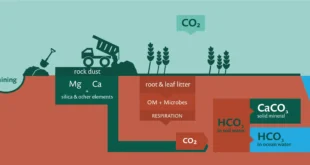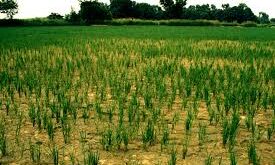- Recently, the Intergovernmental Panel on Climate Change (IPCC), released the second part of its sixth assessment report. This second part of the report is about climate change impacts, risks and vulnerabilities, and adaptation options.
- The first part of this report, on the physical science of climate change in 2021. It had warned that 1.5 degree Celsius warming was likely to be achieved before 2040 itself.
- The third and final part of the report, which will look into the possibilities of reducing emissions, is expected to come out in April 2022.
Important Observations of the Report
- Noting that over 3.5 billion people, over 45% of the global population, were living in areas highly vulnerable to climate change.
- The report identifies India as one of the vulnerable hotspots, with several regions and important cities facing very high risk of climate disasters such as flooding, sea-level rise and heat-waves.
- For example, Mumbai is at high risk of sea-level rise and flooding, while Ahmedabad faces serious danger of heat-waves.
- Complex, Compound and Cascading Risks: The latest report warns that multiple disasters induced by climate change are likely to emerge in different parts of the world in the next two decades.
- Multiple climate hazards will occur simultaneously, and multiple climatic and non-climatic risks will interact, resulting in compounding overall risk and risks cascading across sectors and regions.
- Even if adequate efforts are made to keep the global rise in temperatures within 1.5 degree Celsius from pre-industrial times.
- Even temporarily exceeding this warming level will result in additional severe impacts, some of which will be irreversible.
- The magnitude and rate of climate change and associated risks depend strongly on near-term mitigation and adaptation actions.
- Projected adverse impacts and related losses and damages escalate with every increment of global warming.
- There is a strong focus on the interactions among the coupled systems climate, ecosystems (including their biodiversity) and human society.
Adaptation Risks & Strategies
- The report also highlights large gaps in the adaptation actions that are being taken and the efforts that are required. It says these gaps are a result of “lack of funding, political commitment, reliable information, and sense of urgency”.
- Adaptation is essential to reduce harm, but if it is to be effective, it must go hand in hand with ambitious reductions in greenhouse gas emissions because with increased warming, the effectiveness of many adaptation options declines.
- It is clear now that minor, marginal, reactive or incremental changes won’t be sufficient.
- In addition to technological and economic changes, shifts in most aspects of society are required to overcome limits to adaptation, build resilience, reduce climate risk to tolerable levels, guarantee inclusive, equitable and just development and achieve societal goals without leaving anyone behind.
Assessment Report of IPCC
- The Assessment Reports, the first of which had come out in 1990, are the most comprehensive evaluations of the state of the earth’s climate.
- Every few years (about 7 years), the IPCC produces assessment reports.
- Hundreds of experts go through every available piece of relevant, published scientific information to prepare a common understanding of the changing climate.
- The four subsequent assessment reports, each thousands of pages long, came out in 1995, 2001, 2007 and 2015.
- These have formed the basis of the global response to climate change.
- Over the years, each assessment report has built on the work of the previous ones, adding more evidence, information and data.
SOURCE: THE HINDU,THE ECONOMIC TIMES,MINT
 Chinmaya IAS Academy – Current Affairs Chinmaya IAS Academy – Current Affairs
Chinmaya IAS Academy – Current Affairs Chinmaya IAS Academy – Current Affairs



